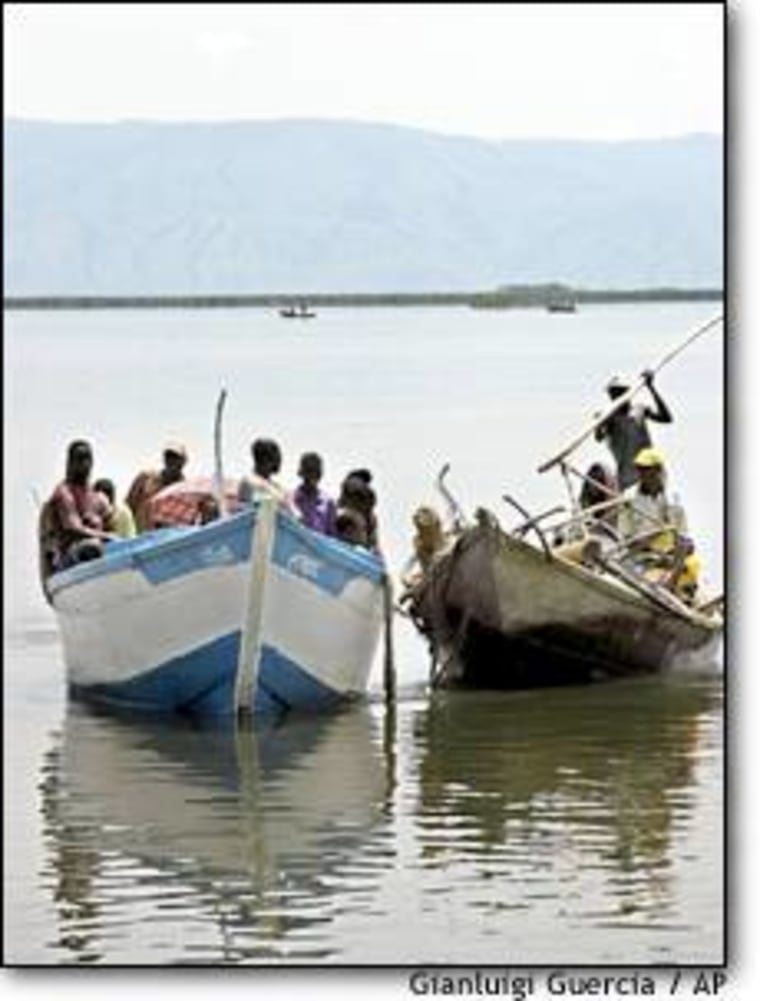Pressured by disturbing reports of escalating ethnic bloodshed in eastern Congo — and mindful of catastrophic failure to respond to similar incidents in Rwanda in 1994 — the United Nations is poised to authorize an emergency peacekeeping force to the violence-wracked African nation.
Unlike the hotly debated Iraq offensive, France has volunteered to lead this force, being assembled in response to Secretary-General Kofi Annan’s call for a “coalition of the willing” to intervene in the Ituri region of Congo.
But France won’t go it alone, and the United Nations is attempting to round up other nations willing to contribute to the force.
A U.N. spokesman said the Security Council had learned its lesson with Rwanda. “It’s now more likely that countries will try harder so they can respond swiftly,” he said. “We know the dangers of waiting a few weeks or a few months.”
As a result, the United Nations would like the emergency force to be in place by next week.
In December 1999, an independent report commissioned by Annan declared the United Nations and its member states failed Rwanda in deplorable ways in 1994, ignoring evidence that a genocide was planned, refusing to act once it was under way and finally abandoning the Rwandan people when they most needed protection.
After rampaging killers gunned down 10 Belgian peacekeepers at the beginning of the genocide, there was little will to keep the peacekeepers in place, much less strengthen their mandate, the report said.
U.N. UNDER FIRE
Now, the United Nations fears that ethnic warfare in Ituri will get out of hand.
On Thursday, the U.N. Commissioner for Human Rights warned that the world was turning a blind eye to the mayhem. “Congo is truly the immediate problem. People are dying there by the hundreds and that is not happening anywhere else in the world. But who is paying attention?” Sergio Vieira de Mello said.
The fighting between rival Hema and Lendu fighters has already overwhelmed the lightly armed 625-man Uruguayan U.N. contingent protecting the U.N. compound in Bunia, the largest city in the region.
“There’s firing everywhere, from mortars, Kalashnikovs and other heavy arms,” Patricia Tome, a U.N. spokeswoman, told the Associated Press on Wednesday from the U.N. base, a three-story building on a few acres surrounded by walls.
More than 10,000 terrorized civilians have sought shelter in and around the compound as a fresh wave of fighting left at least 10 people dead, including women and children.
“The people are piling up on each other at the compound, inside as well as out,” said a civilian, identifying himself only as Christian.
“They use the Kalashnikovs to scare people and the machetes to kill them,” said another U.N. official at the compound, speaking on condition of anonymity.
One civilian was killed Tuesday inside the compound after being struck in the cross-fire.
On Tuesday, the U.N. Children’s Fund, UNICEF, sent two planeloads of relief items from Goma to Bunia to assist the victims of the renewed fighting.
The agency said that while the extent of the displacement of population was not yet known, it feared that “hundreds of thousands” of people, mainly children and women, were fleeing the violence “and the starvation it has brought in its wake.”
UGANDAN PULLOUT
The fighting erupted after Uganda withdrew the last of 6,000 soldiers that had occupied Bunia on May 7.
Uganda’s pullout came as part of peace deals meant to end the five-year, six-nation war in Congo, Africa’s third-largest nation. Relief groups estimate the war killed as many as 3 million people, most of them civilians.
In pulling out of Bunia, Ugandan forces left behind an arsenal of anti-aircraft batteries, anti-tank guns and other arms that the tribal militias have seized, Gen. Mountago Diallo, commander of the U.N. military mission in Congo, said Wednesday.
At the United Nations, the chief U.N. war crimes prosecutor warned Tuesday that fighting in the region could escalate.
“Our evaluation of what we know — it could be a genocide,” said Carla Del Ponte, who is in charge of prosecuting perpetrators of the 1994 genocide in neighboring Rwanda and those responsible for war crimes and crimes against humanity in the former Yugoslavia.
‘ETHNIC PURIFICATION’
The U.N. plan is to eventually beef up the peacekeeping operation in Congo, known as MONUC. But in the meantime, Annan has called for nations to volunteer troops to go immediately to Congo on a temporary basis.
France has taken the lead in drafting a Security Council presidential statement to do just that — and has received the support of the United States and other major nations.
U.N. officials said South African President Thabo Mbeki has suggested that an African force be sent to the region, but it’s not clear what nations would be willing to offer their troops. Likely excluded would be the neighboring nations that waged the devastating proxy war in Congo.
On the political front, Congo President Joseph Kabila flew to internationally brokered talks with Bunia’s militia leaders, due to start Thursday in the Tanzanian city of Dar es Salaam.
But the omens are grim. According to Human Rights Watch, both the Hema and Lendu have an “agenda of apparent ethnic purification.”
Up to 50,000 people have been killed in the violence between the two tribes in recent months, according to humanitarian groups. Some 500,000 more people fled, mostly to Uganda. At issue is land claimed by both the nomadic Hema and the farming Lendu.
“People in Ituri can’t wait months for help to come,” said Alison Des Forges, senior adviser to the Africa Division of Human Rights Watch. “They’re looking to the U.N. and to the rest of us for protection now,” she said in a recent statement.
The Associated Press contributed to this report.
